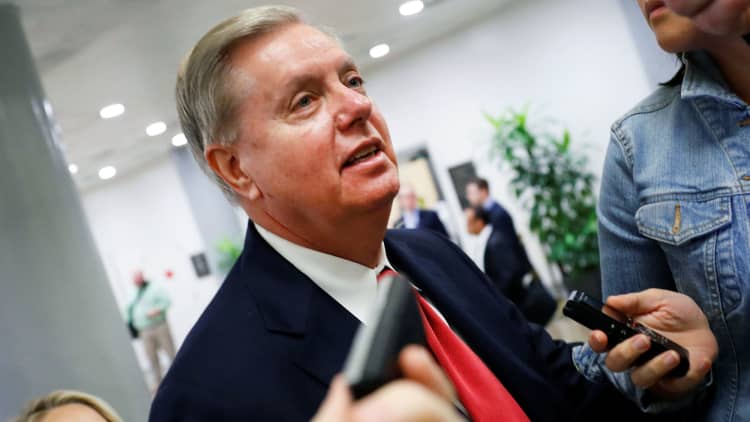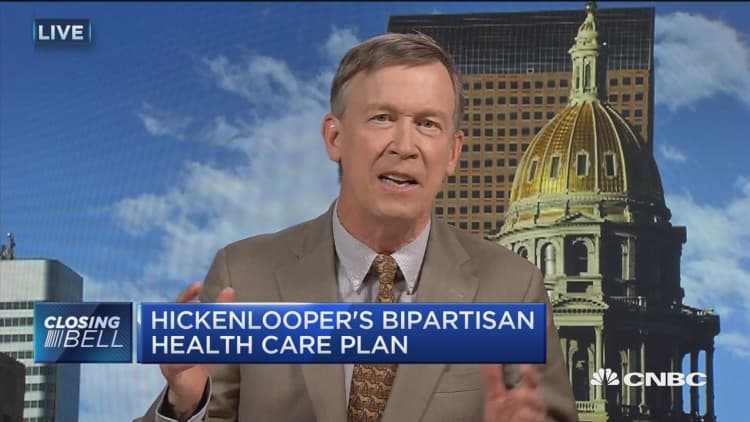
The Senate will not hold a vote this week on the crippled Republican bill to repeal and replace Obamacare, GOP lawmakers said Tuesday, kicking the issue into possibly next year, or even later.
The decision came a day after Sen. Susan Collins, R-Maine, effectively doomed the so-called Graham-Cassidy bill to defeat by saying she would join two other GOP lawmakers in voting against it. Republican leaders could only afford two defections if the bill was to pass.
The move to table the legislation is the latest in a series of embarrassments for Republican leaders. They have repeatedly failed to convince enough members of their own party to support a repeal bill, despite the GOP long promising passage of such legislation to voters.
Sen. Lindsey Graham, R-S.C., a lead sponsor of the bill, said the Senate would revisit his legislation after it tries to pass tax reform legislation.
"We're gonna come back to this after taxes," Graham said at a news conference.
Graham tried to put a brave face on the move, saying his bill offered a much better alternative to what he called the failure of Obamacare.
"It's not a matter of if, only a matter of when," Graham said. "We're on a path to pass Graham-Cassidy-Heller-Johnson."
But he also acknowledged that the rush in the past several weeks to pass his bill, without a traditional series of committee hearings on its details, may have played a role in its failure so far.
"With a process that gives more attention and time, we will repeal and replace Obamacare with a block grant [bill] called Graham-Cassidy-Heller-Johnson," Graham said, referring to the funding structure of the legislation.
"We're going to have time to explain our concept, we'll have a better process, and we're going to take this show on the road."
President Donald Trump earlier Tuesday harshly criticized the trio of Republicans who opposed the controversial Graham-Cassidy bill.
"We don't know why they did it," Trump said of Collins, John McCain of Arizona and Kentucky's Rand Paul.
"We are disappointed in certain so-called Republicans."
The GOP holds 52 seats in the Senate. It needed 50 Republican senators to vote for the bill for it to pass, since no Democrat or independent would have voted for the legislation.
Collins' decision to oppose the bill Monday evening came minutes after the Congressional Budget Office, in a preliminary analysis, said that if Graham-Cassidy becomes law the number of people with health insurance that covers "high-cost medical events would be reduced by millions."
A wide array of groups representing health providers, insurers, patients and older Americans were opposed to the bill, which also was viewed negatively by much of the public, according to recent polls.
Driving that opposition was concern that if the bill became law, up to 20 million or more people would become uninsured, and premiums in the individual health plan market would rise significantly for people with pre-existing health conditions.
The CBO said that Graham-Cassidy would slash funding for Medicaid, which provides health coverage to primarily poor people, but $1 trillion over the next decade.
The bill would have repealed the Affordable Care Act mandates that require most Americans to have health insurance or pay a fine. It also would have eliminated the ACA's system of subsidizing health insurance purchases on the individual market, and ended the expansion of Medicaid benefits to more poor adults.
In its place, the bill would have given individual states block grants of federal funds, which they then would have to use to create their own health-care coverage systems.
Graham said there is "universal agreement" among Senate Republicans that "Obamacare is failing, can't be repaired, it's structurally flawed."
But, he added, "the missing agreement for us as Republicans has been we know what we don't like. Obamacare is not working, we make that case effectively. But we've had a hard time articulating what we're for until now. Now we have something to talk about that makes sense."
"The good news for America is Republicans are not just going to deliver on campaign promises, we're actually going to improve health care by giving you access to people who care more about you at home than any bureaucrat could do here in Washington," Graham said.
He said the bill is "a simple proposition, taking basically the same amount of money, in a fair way allocate it to the states."
Graham also said that by having states decide what to do with the money, Obamacare would be replaced "with a system closer to where you live, controlled by people you can vote for."
The liberal think tank Center on Budget and Policy Priorities said that despite Graham's claims, the bill would have reduced federal funding for individual insurance plan purchases and expansion of Medicaid benefits by more than $240 billion from 2020 to 2026.
In 2026, there would be 20 states whose block grant funding under the bill would have been anywhere between 35 and almost 60 percent below what they would have received under Obamacare, CBPP said.
In an analysis published Monday, the CBPP said the bill "would ultimately cause tens of millions of people to lose health coverage and weaken coverage for millions more."
WATCH: Gov. Hickenlooper on how to stabilize health care market



